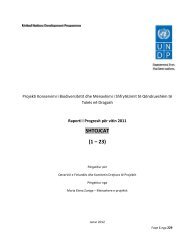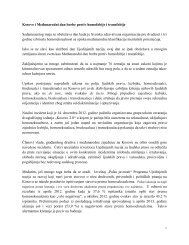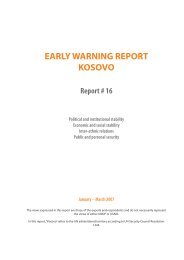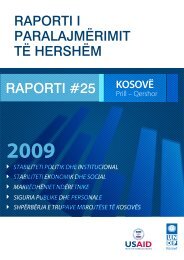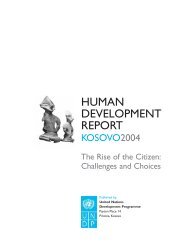Kosovo Human Development Report 2010 - UNDP Kosovo - United ...
Kosovo Human Development Report 2010 - UNDP Kosovo - United ...
Kosovo Human Development Report 2010 - UNDP Kosovo - United ...
Create successful ePaper yourself
Turn your PDF publications into a flip-book with our unique Google optimized e-Paper software.
of exclusion. Discriminatory policies<br />
and practices limit the interactions<br />
of groups and individuals with their<br />
social, legal, and economic environments.<br />
Discrimination is not limited to<br />
race, religion and gender. It extends to<br />
geographical areas, income, education<br />
levels, health status and age. It happens<br />
in highly industrialized nations as<br />
well as in developing countries. Social<br />
exclusion is more pernicious and damaging<br />
than poverty alone. Its multiple<br />
dimensions affect every area of life, including:<br />
• Economic exclusion, which results<br />
from inequalities in ownership of<br />
assets, incomes and employment<br />
opportunities;<br />
• Exclusion from social services,<br />
which results from inequalities in<br />
access to a range of services – education,<br />
health, housing, and social<br />
protection;<br />
• Exclusion from political participation,<br />
which results from unequal<br />
access to political opportunities,<br />
justice, freedoms, institutions and<br />
decision making mechanisms at<br />
many levels (from national to community<br />
level); and<br />
• Cultural status exclusion, which<br />
results from differences in recognition<br />
and (de facto) hierarchical<br />
status of different groups’ cultural<br />
norms, customs and practices.<br />
These dimensions of social exclusion<br />
tend to reinforce each other. 22<br />
Variables that induce social exclusion<br />
tend to act together at various levels<br />
and over time to produce the effects<br />
that are commonly referred to as relational-based<br />
deprivation. Excluded<br />
groups and individuals have little access<br />
to decision-making bodies and<br />
little chance of influencing decisions<br />
or policies that affect them. As they fall<br />
down the social scale, they become<br />
increasingly marginalized. While exclusion<br />
may result from shocks during the<br />
course of life or in periods of societal<br />
transition, it is most frequently triggered<br />
by circumstances of birth. Being<br />
born into poverty or to relatively unskilled<br />
parents, for example, inevitably<br />
makes a child far more likely to be excluded<br />
and to pass exclusion on down<br />
the generations.<br />
Social exclusion has three primary<br />
drivers: (i) structures and institutions:<br />
public and private sectors both contribute<br />
to exclusion by either fostering<br />
discrimination or failing to act to<br />
protect the excluded; (ii) values and<br />
behavioural patterns: these determine<br />
discriminatory attitudes and cultural<br />
practices that regulate norms in society<br />
and among groups (including<br />
forms of self-exclusion); and (iii) policies:<br />
these reflect and respond to both<br />
structures and values, codifying them<br />
for long-term application.<br />
Social exclusion is most likely to<br />
occur where there are:<br />
Discriminatory laws and inadequate<br />
law enforcement. Discriminatory or inappropriate<br />
legislation is a primary cause<br />
and perpetuator of social exclusion. These<br />
frequently spring from insufficient understanding<br />
of the dynamics of vulnerability<br />
and inadequate reflection of the needs of<br />
socially excluded groups in policy instruments.<br />
Existing policies promoting social<br />
inclusion may not be effective in protecting<br />
excluded groups due to their lack of<br />
commitment, inadequate resources and<br />
lack of policy enforcement and oversight.<br />
In addition, where adequate legislation is<br />
in place, poorly enforced laws can make<br />
such legislation meaningless.<br />
SOCIAL INCLUSION AND HUMAN DEVELOPMENT - A CONCEPTUAL BACKGROUND<br />
| 25




